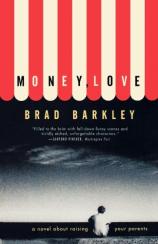Reading Group Guide
Discussion Questions
Money, Love

1. In the above piece, Brad Barkley comments on his early fascination with carnival carnies, referring to them as "artists," and likewise Gabe seems more drawn to the skills and methods of his salesman father than to the pop artists who display their work downtown. What does the novel have to say about the nature of art? In what sense can salesmen and carnies be thought of as artists? Does defining something as "art" have to do solely with the medium (e.g., Gabe's struggle with sculpture) or more with the relationship between the artist and his or her medium, no matter what it is? Another way of thinking about it: who is more the artist, Dutch when he plays guitar, or Roman when he sells cleaning products (or, for that matter, Rod McKuen when he writes poetry)?
2. Near the end of the novel, Gabe reflects on Gladys's new marriage, saying that she would learn that while wild, blind, crazy love will not work, neither will an ordered, systematic approach to love. Is there an example in the novel of love that does work? Do any of the characters love the right way, or love purely? How so? What defines the "right kind" of love, and how can it work between two people?
3. As a follow-up, consider the title and the epigram from which it is taken: "Money, love . . . no money, no love." While most people would automatically say that love cannot be bought, can love be traded? Do we use love as a kind of commodity, as a system of barter? How so? What are some examples from the novel and otherwise?
4. One of the major themes of the novel is the evolving relationship between Gabe and Roman. At one point, Gabe even wishes for "normal" parents, from whom he could keep things hidden. Is Roman a great father or a terrible one? What makes him great or terrible? How would you think about your childhood looking back, if you had a father with traits similar to Roman's?
5. At one point, Sandy accuses Gabe of being the only person she knows who is worried how his past is going to turn out, and, in fact, looking backward and feeling nostalgic are constant threads through the book (consider Roman and all his leftover '50s clothing and manners). What does the novel have to say about the nature of nostalgia and why we feel it? How do the James Dean and Jayne Mansfield "characters" and the presence of old cars relate to that theme? Is nostalgia generally a positive emotion or a corrosive one? Is it honest? If so, why?
6. In his essay on why he wrote the book, Barkley talks about what he sees as the "homogenization" of buying and selling, the increasingly generic quality of commerce. Do you think he's right, or is this just another kind of nostalgia? Have we lost something in the arena of commerce in the name of increasing efficiency and profit? If so, what exactly? Is it "art," as the author suggests, or something less lofty?
7. Barkley grew up in North Carolina where the story is set. He has said elsewhere that his experience of the South was not the typical south of pickup trucks, shotguns, beer-drinking, and backwoods, but rather was characterized more by subdivisions, shopping centers, strip malls, and middle-class suburbia. Has this description now become more typical than the former? Is the author's experience reflective of what many call the "New South"? If so, what does it say about the direction that the South has taken (collectively, as a region) in the last generation? Is it more homogenization? Is this progress, or is the South in some way losing its identity? Given the absence of pickup trucks and shotguns, what quality is present that would cause us to still regard Money, Love as "southern fiction"?
8. Despite all the sadness of the characters and events, Money, Love is still touted as a comic novel. Where do the humorous elements most fully come into play in the story? How is this novel in keeping with what is understood as the "comic tradition," in the sense that it is comic as opposed to tragic. What traditional elements of the comic are at work here?
9. Which character did you most strongly identify with, and why? In a larger sense, what is it in characters that causes us to identify with them, since their circumstances rarely match our own? What is it in fiction that causes this kind of connection to occur?
10. Why is Gabe the one who tells this story? Do we need him at the center of things, acting both as an anchor and as our surrogate? Why? Is he reliable as a narrator? Why do we trust him (if in fact we do) given that during the course of the novel he lies, cheats, lusts, and steals?
Money, Love
- Publication Date: March 11, 2013
- Paperback: 336 pages
- Publisher: W. W. Norton & Company
- ISBN-10: 0393322181
- ISBN-13: 9780393322187






